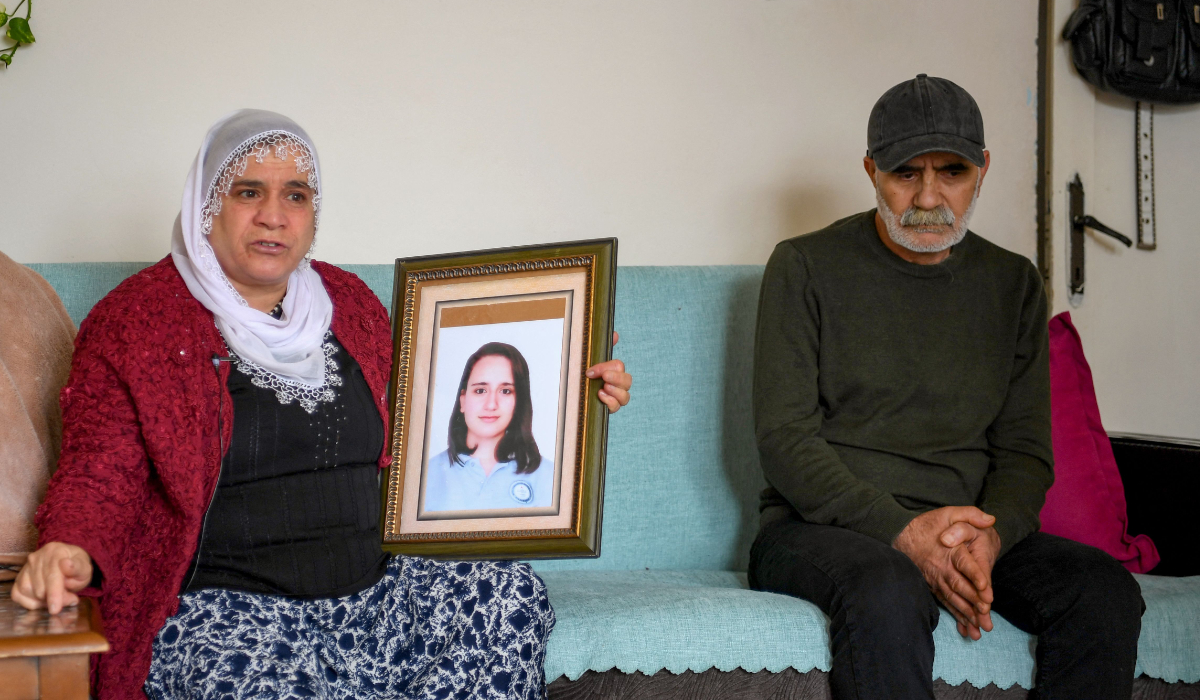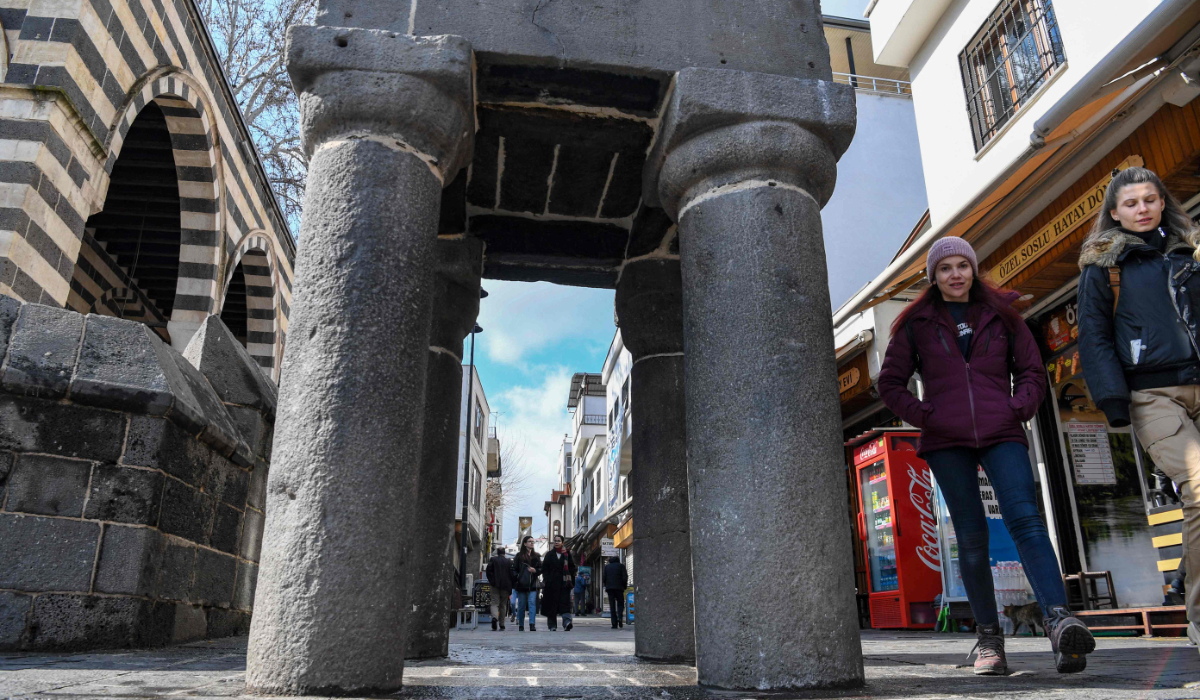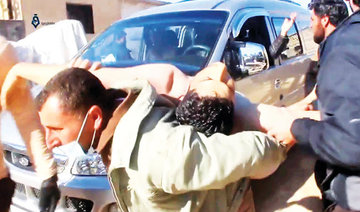UNITED NATIONS: Britain’s UN ambassador called Friday for sanctions against Syria after international chemical weapons investigators declared the Syrian government responsible for a sarin nerve gas attack that killed over 90 people last spring.
But it’s not clear what action, if any, would pass muster with veto-wielding Syrian ally Russia, which dismissed the experts’ findings as inconsistent and unpersuasive. And while the British envoy said the Security Council needs to “impose accountability,” his French counterpart focused on finding common ground on an issue that has spurred a series of Russian vetoes.
The attack in the Syrian town of Khan Sheikhoun in April sparked outrage around the world and a US strike days later on the Shayrat air base, where Washington said the attack had been launched. Syria’s government has denied involvement.
But the investigators’ new report, obtained Thursday by The Associated Press, says experts are “confident” Damascus was behind the sarin strike, based on photos, videos and satellite images as well as studies of munition remnants. The report was done by what’s known as the Joint Investigative Mechanism, or JIM, which the United Nations and the Organization for the Prohibition of Chemical Weapons established to determine responsibility for chemical attacks in Syria.
The report also blamed the Daesh extremist group for a September mustard gas attack in Um Hosh in Aleppo.
In light of the findings, British Ambassador Matthew Rycroft said Friday that the Security Council needs to follow through on a 2013 vow to respond to any chemical attacks in Syria with use of a UN charter chapter that generally amounts to sanctions.
“It now falls on the Security Council to act on these findings and to deliver justice,” he said, exhorting Russian officials “to find their moral compass and join the Security Council in following up this use of sarin by the regime and making sure, once and for all, that all those responsible are held to account.”
Britain, France and the United States spearheaded an effort last winter to ban helicopter sales to Syria and impose an asset freeze and travel ban on 11 Syrian military officers and others over prior chemical attacks; Russia and China vetoed that measure. US Ambassador Nikki Haley, who was traveling in Africa on Friday, said in response to the new report that the council should make it clear that chemical weapons use by anyone “will not be tolerated.”
French Ambassador Francois Delattre vowed accountability for those responsible for the Khan Sheikhoun attack. As for whether that means a sanctions effort, he said discussions were ongoing, but “the key priority now is to recreate consensus.”
The report came days after Russia vetoed a proposal to extend the JIM’s work, with Ambassador Vassily Nebenzia saying that the matter should wait for the findings and that Moscow will insist on amending the group’s mandate to ensure “the professionalism and impartiality that we want to see.”
Russia has questioned the JIM’s methods, and Moscow has said its own analysis of photos of the Khan Sheikhoun attack site suggest that what happened was not an airstrike, but an explosion on the ground.
Russia’s Foreign Ministry said Friday that the JIM had ignored Moscow’s input.
“The report includes completely contradictory conclusions” that “are not supported by any convincing argument,” the ministry said in a statement.
___
Associated Press writer Jim Heintz contributed from Moscow.
Britain urges UN to act on report blaming Syria for chemical attack
Britain urges UN to act on report blaming Syria for chemical attack

Families yearn for an end to PKK-Turkiye war

- The PKK’s jailed founder Abdullah Ocalan is widely expected to urge followers to lay down their arms in the coming weeks
- The new peace efforts are backed by President Recep Tayyip Erdogan’s government, and families on both sides of the divide want it to succeed
DIYARBAKIR, Turkiye: A mother weeping for a teenaged daughter shot dead by a Turkish sniper and a father mourning a son killed by PKK militants are among countless families hoping that a new peace drive can end Turkiye’s four-decade-old Kurdish conflict.
Both live in the Kurdish-majority southeast, where tens of thousands of lives have been lost in violence between the Turkish state and the outlawed Kurdistan Workers’ Party (PKK).
The new peace efforts are backed by President Recep Tayyip Erdogan’s government, and families on both sides of the divide want it to succeed.

At her home in the city of Diyarbakir, Fahriye Cukur, 63, cannot take her eyes off a picture on the wall of her daughter Rozerin in school uniform. She was killed during clashes between militants and security forces in January 2016.
The collapse of a truce in 2015 sparked a new round of the conflict when many government curfews were imposed, including in the city’s Sur district.
Cukur said her daughter — who was passionate about photography — had gone to Sur during a break in a curfew to collect exam papers from friends. But the authorities suddenly reduced the break from five hours to three and the fighting reignited.
“People were stuck there, including my daughter. She took refuge at the home of an elderly couple, but when she tried to leave, she was shot by a sniper,” her mother told AFP.
The family found out about the death through a news bulletin.
It took five months, several protests and a hunger strike for the grieving parents to get her body back.

Cukur said the authorities had mixed up their teenage daughter with a female PKK fighter, codenamed Roza, who had been hiding in the same district.
They claimed she had been trained in the mountains, but her mother told AFP: “My daughter was never engaged in political activism.
“She loved school, she wanted to become a psychiatrist and help her people,” she added, indicating the “TC” insignia — meaning “republic of Turkiye” — on her school uniform.
The PKK’s jailed founder Abdullah Ocalan is widely expected to urge followers to lay down their arms in the coming weeks.
Many families hope this will end the conflict and spare other families from the pain they live with.
“We can’t forget what happened but we have to hope. I have two more kids: how do I know the same thing won’t happen to them tomorrow?” she said.
Last month, the International Crisis Group said clashes between the militants and Turkish troops were largely confined to northern parts of Iraq and Syria, with violence on Turkish soil at its lowest level since 2015.
“At least we can breathe a bit now,” she said.
“I want the bloodshed to stop. I want a ceasefire. And I am not alone.”
In the nearby province of Mardin, Sehmuz Kaya, a 67-year-old Kurd, recalled how his son Vedat, a police officer, was kidnapped by PKK militants in eastern Turkiye in July 2015.
Vedat Kaya, wearing civilian clothes, was in a car with his brother and four others when militants blocked the road.
“They only kidnapped Vedat,” he told AFP, saying it was months before the family saw a PKK video of him in the Kandil mountains of northern Iraq.
The family tried every possible channel, through the state and the main pro-Kurdish party, to secure his release.
But after six years, they received a devastating call from the authorities, who said he was one of the 13 “Gara martyrs.” The 13, all but one of whom were soldiers or police, had been killed by the PKK in the Gara region of northern Iraq.
“I was devastated,” he said, struggling for words, saying his son had been tortured before his death.
“They have no faith nor conscience. My son was just doing his job,” he said.
Pinned on the ceiling is a huge Turkish flag, and on the walls are photos of Vedat, whose name has been given to a nearby park.
Although he wants peace more than anything, he admitted he has little faith.
“They are not honest,” he snapped, referring to DEM, the main pro-Kurdish party that is relaying messages from Ocalan to the government. He suspects they have ties to the PKK.
“The families of the martyrs are heartbroken. Enough is enough,” he said. “We support the process but we want something real.”
Israel defense minister announces agency for ‘voluntary departure’ of Gazans

- Earlier this month, Katz said he had ordered the army to formulate a plan to allow Palestinians to leave Gaza
JERUSALEM: Israel’s Defense Minister Israel Katz said Monday that a special agency would be established for the “voluntary departure” of Gazans, after Israel expressed commitment to a US proposal to take over the Palestinian territory and expel its residents.
“Defense Minister Israel Katz held a meeting today (Monday) on the voluntary departure of Gaza residents, at the end of which he decided that a directorate for the voluntary departure of Gaza residents would be established within the ministry of defense,” a ministry statement said.
Earlier this month, Katz said he had ordered the army to formulate a plan to allow Palestinians to leave Gaza, adding that he welcomed “Trump’s bold plan, which could allow a large portion of Gaza’s population to relocate to various places around the world.”
An initial plan presented during the meeting on Monday “includes extensive assistance that will allow any Gaza resident who wishes to emigrate voluntarily to a third country to receive a comprehensive package, which includes, among other things, special departure arrangements via sea, air, and land,” the statement added.
Earlier on Monday, Israeli Prime Minister Benjamin Netanyahu said he was “committed to US President Donald Trump’s plan for the creation of a different Gaza,” also promising that after the war, “there will be neither Hamas nor the Palestinian Authority” ruling the territory.
Trump’s repeated proposal for a US “takeover” of Gaza and the resettlement of Palestinians in other countries such as Egypt and Jordan lacks detail but has triggered widespread international outrage.
Hamas’s October 7, 2023 attack on Israel sparked the Gaza Strip’s deadliest war and resulted in the deaths of 1,211 people, mostly civilians, according to an AFP tally of Israeli official figures.
Israel’s retaliatory campaign has killed at least 48,284 people in Gaza, the majority of them civilians, according to figures from the health ministry in the Hamas-run territory that the United Nations considers reliable.
More than 15 months of war destroyed or damaged more than 69 percent of Gaza’s buildings, displaced almost the entire population, and triggered widespread hunger, according to the United Nations.
Zelensky says arrived in Turkiye for talks with Erdogan

KYIV, Ukraine: Ukrainian President Volodymyr Zelensky said Monday he had arrived in Turkiye for talks with Turkish counterpart Recep Tayyip Erdogan on prisoner exchanges and other matters.
“Official visit with the First Lady to Turkiye. Meetings with President Erdogan and First Lady Emine Erdogan,” Zelensky said on his Telegram account.
In first, French minister visits Western Sahara claimed by Morocco

- Algeria has backed the separatist Polisario Front and had already cut diplomatic relations with Rabat in 2021 — the year after Morocco normalized ties with Israel under a deal that awarded it US recognition of its annexation of the Western Sahara
LAAYOUNE: France’s Culture Minister Rachida Dati became on Monday the first French official to make a formal visit to the Western Sahara, a sign of Paris’s recognition of Moroccan sovereignty over the disputed territory.
“This is the first time that a French minister has come to the southern provinces,” Dati told AFP, using Morocco’s name for the area, a former Spanish colony controlled by Rabat but claimed by the Algeria-backed Polisario Front.
Dati described the visit as “historic.”
The United Nations considers Western Sahara a “non-self-governing territory” and has had a peacekeeping mission there since 1991, whose stated aim is to organize a referendum on the territory’s future.
But Rabat has repeatedly rejected any vote in which independence is an option, instead proposing autonomy under Morocco.
Dati, accompanied by Moroccan Culture Minister Mohamed Mehdi Bensaid, launched a French cultural mission in Laayoune, Western Sahara’s main city.
She promised to open the territory’s first French culture center to “benefit children in the region, but also teachers, schools, students and teacher trainers.”
In Dakhla, the Western Sahara’s second city some 530 kilometers (330 miles) south of Laayoune, Dati said she is set to sign a cooperation agreement in the field of cinema and audiovisual art.
France’s stance on Western Sahara has been ambiguous in recent years, often straining ties between Rabat and Paris.
But in July, French President Emmanuel Macron said that Morocco’s autonomy plan was the “only basis” to resolve the Western Sahara dispute.
The turnabout marked by Macron’s statement drew a strong reaction from Algiers.
Algeria has backed the separatist Polisario Front and had already cut diplomatic relations with Rabat in 2021 — the year after Morocco normalized ties with Israel under a deal that awarded it US recognition of its annexation of the Western Sahara.
Macron renewed French support for Morocco’s plan in October, pledging investments and a “strong and exceptional partnership.”
Also in October, the UN Security Council called for parties to “resume negotiations” to reach a “lasting and mutually acceptable solution” for the Western Sahara dispute.
Israel minister says Hamas must leave Gaza, surrender arms

- “If Hamas refuses this ultimatum, Israel will open the gates of hell,” said Smotrich, echoing an expression used by both Trump and Netanyahu
JERUSALEM: Israel’s far-right Finance Minister Bezalel Smotrich said on Monday that Hamas militants must surrender their arms and leave Gaza.
He was speaking ahead of a cabinet meeting to discuss the next phase of the truce between Israel and Hamas Palestinian militants.
Smotrich in a video statement said he “will demand a vote” by ministers on US President Donald Trump’s plan and that Israel must “issue a clear ultimatum to Hamas — immediately release all hostages, leave Gaza for other countries, and lay down your arms.”
“If Hamas refuses this ultimatum, Israel will open the gates of hell,” said Smotrich, echoing an expression used by both Trump and Prime Minister Benjamin Netanyahu.
A strong opponent of stopping the war, he has threatened to quit Netanyahu’s ruling coalition if the war is not resumed after the end of the first stage of the ceasefire.
Trump’s plan lacked detail but has triggered widespread outrage internationally for his call to resettle Palestinians in other countries such as Egypt and Jordan under a US “takeover” of Gaza.
Smotrich said Israel should go for a “complete conquest” of the territory.
According to Israeli media, the security cabinet convened on Monday evening to discuss phase two of the fragile ceasefire which began on January 19.
More than 15 months of war destroyed or damaged more than 69 percent of Gaza’s buildings, displaced almost the entire population, and triggered widespread hunger, according to the United Nations.
“It’s them or us. Either we crush Hamas, or God forbid, Hamas will crush us,” Smotrich said.
“I call on the prime minister to declare that once the war resumes after Phase One, Israel will, from the first day, seize 10 percent of Gaza’s territory, establish full sovereignty there, and immediately apply Israeli law,” he added.
“Furthermore, it must be announced that once combat resumes, all humanitarian aid will be completely halted.”
Smotrich further said that according to a plan currently in preparation “Gaza’s residents will be allowed to leave, but only in one direction — with no possibility of return.”
“The loss of territory is the only heavy price our enemies understand — the only thing that will make them realize we are serious,” Smotrich added.
Since the first phase of the truce began last month, 19 Israeli hostages have been released in exchange for more than 1,100 Palestinian prisoners.
Out of 251 people seized in Hamas’s October 7, 2023 attack on Israel, which sparked the war, 70 remain in Gaza, including 35 the Israeli military says are dead.






















